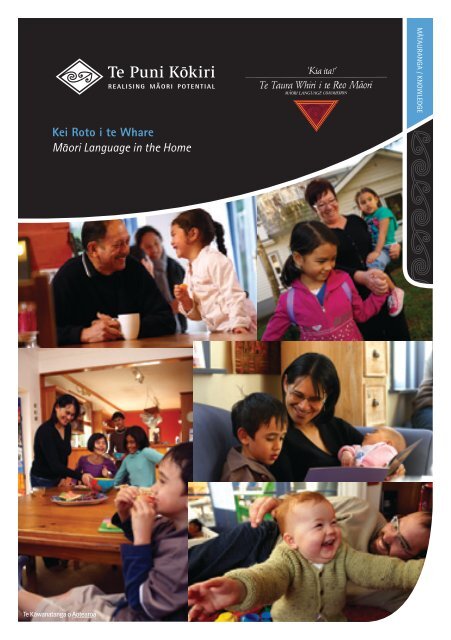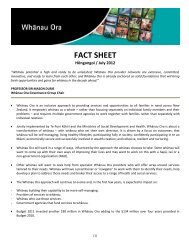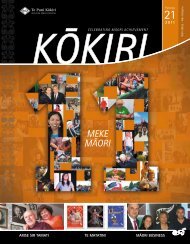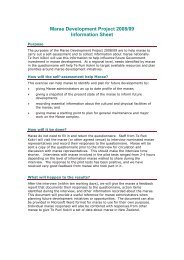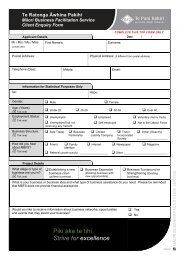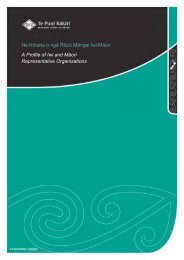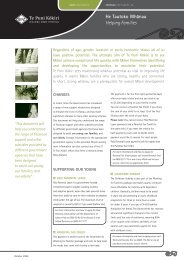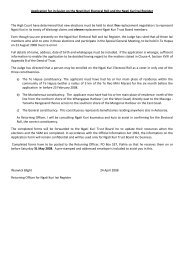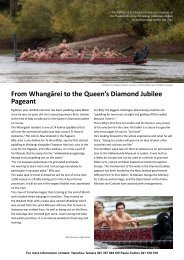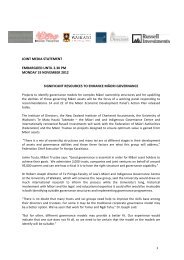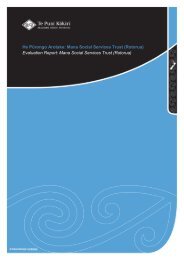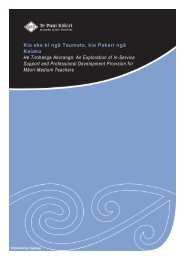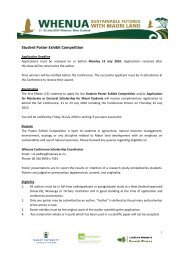Create successful ePaper yourself
Turn your PDF publications into a flip-book with our unique Google optimized e-Paper software.
<strong>Kei</strong> <strong>Roto</strong> i <strong>te</strong> <strong>Whare</strong><br />
Mäori Language in the Home<br />
MÄTAURANGA / KNOWLEDGE
Ko töku reo, töku ohooho; töku reo, töku mapihi<br />
maurea; töku reo, töku whakakai marihi.<br />
My language is my inspiration, my special gift,<br />
my precious treasure.<br />
REALISING MÄORI POTENTIAL<br />
Mätauranga – Building of knowledge and skills.<br />
MÄTAURANGA KNOWLEDGE<br />
1<br />
WHAKAMANA INFLUENCE<br />
+ + =<br />
RAWA RESOURCES<br />
TE IRA TANGATA LIFE QUALITY<br />
2 3 4<br />
1<br />
This area acknowledges the importance of knowledge to building<br />
confidence and identity, growing skills and talents and generating<br />
innovation and creativity. Knowledge and skills are considered as<br />
a key enabler of Mäori po<strong>te</strong>ntial as they underpin choice and the<br />
power to act to improve life quality.<br />
2 Whakamana – Strengthening of leadership and decision-making.<br />
3 Rawa – Development and use of resources.<br />
4 <strong>Te</strong> Ira Tangata – The quality of life to realise po<strong>te</strong>ntial.<br />
The framework above identifies three key<br />
enablers that are fundamental to Mäori<br />
achieving <strong>Te</strong> Ira Tangata (improved life<br />
quality) and realising their po<strong>te</strong>ntial.<br />
All our writ<strong>te</strong>n information has been<br />
organised within these three key enablers<br />
or <strong>Te</strong> Ira Tangata.<br />
DISCLAIMER The information contained in this publication is for general<br />
information only. While every effort has been made to ensure the accuracy<br />
of the information, because the information is generalised, its accuracy<br />
cannot be guaran<strong>te</strong>ed. Readers are advised to seek independent advice<br />
on particular mat<strong>te</strong>rs and not rely on this publication. No liability is<br />
assumed by <strong>Te</strong> <strong>Puni</strong> Kökiri for any losses suffered directly or indirectly<br />
by any person relying on the information contained in this publication.<br />
© <strong>Te</strong> <strong>Puni</strong> Kökiri 2008 ISBN: 0-478-26073-3 July 2008
KEI ROTO I TE WHARE<br />
Mäori Language in the Home<br />
Reprint 2008
This booklet is designed to help you with decisions about learning<br />
and speaking <strong>te</strong> reo Mäori within your household.<br />
It provides you with:<br />
• information about the importance of using <strong>te</strong> reo Mäori;<br />
• stra<strong>te</strong>gies you can use to overcome any language issues you<br />
may be facing; and<br />
• lists of Mäori language phrases that you can use with<br />
members of your whänau.<br />
For ease of reference, the booklet has been divided into coloured<br />
sections.<br />
WHERO (RED): contains information about Mäori language<br />
revitalisation and the importance and benefits of speaking Mäori<br />
in the home.<br />
KARAKA (ORANGE): contains information for people just starting<br />
out with <strong>te</strong> reo.<br />
KÖWHAI (YELLOW): contains information for people with some<br />
Mäori language skills.<br />
KÄKÄRIKI (GREEN): contains stra<strong>te</strong>gies that may help you and<br />
pitfalls to look out for.<br />
KAHURANGI (BLUE): contains information for fluent speakers of <strong>te</strong><br />
reo.<br />
WAIPOROPORO (PURPLE): contains information about available<br />
resources, action lists, and Mäori language phrase lists.
ACKNOWLEDGEMENTS<br />
We would like to acknowledge the people that organised<br />
and participa<strong>te</strong>d in our 2001 research about Mäori<br />
Language In<strong>te</strong>rgenerational Transmission: the factors<br />
that assist or hinder speaking Mäori within the family.<br />
The support that we received from Pania Houkamau,<br />
Heremia Sua, Lynne-Harata <strong>Te</strong> Aika and Tüwhakairiora<br />
Williams was crucial to the success of the research; their<br />
recruitment and organisation of participants helped to<br />
ensure that our work remained on track.<br />
Research participants from Porirua, Wellington,<br />
Christchurch and Öpötiki took part in our focus groups<br />
and in<strong>te</strong>rviews with honesty and goodwill. Thank you<br />
all for your willingness to share your thoughts and<br />
experiences with us. Some of the things that you<br />
shared, although expressed in humour, hid elements of<br />
pain, sorrow and anger. However, through your honesty<br />
and openness, we are in a bet<strong>te</strong>r position to understand<br />
how to increase the use of Mäori in our families and to<br />
overcome the barriers that exist.<br />
Nö reira, e hika mä, tënä rawa atu koutou.
TABLE OF CONTENTS<br />
FOREWORD 1<br />
HE KUPU WHAKATAKI 2<br />
INTRODUCTION 3<br />
MÄORI LANGUAGE REVITALISATION – WHEN WHÄNAU<br />
USE IT WE WON’T LOSE IT 5<br />
TE ARA TUATAHI - BEGINNING THE JOURNEY 11<br />
HE KUPU HOU, HE KÖRERO HOU - LEARNING MÄORI 15<br />
KÖRERO, KÖRERO, KÖRERO - SPEAKING MORE MÄORI 17<br />
HE HIPA, HE TAIEPA… ME HAERE TONU…<br />
POSSIBLE BARRIERS AND PITFALLS 19<br />
ME PËHEA KOE E ÄWHINA AI? 21<br />
FURTHER INFORMATION 25<br />
PHRASES TO USE 29<br />
Waking Up in the Morning 30<br />
Feeding your Baby 31<br />
Putting on a Fresh Nappy 32<br />
Washing your Baby 33<br />
Travelling in the Car 34<br />
Looking af<strong>te</strong>r Sick Children 35<br />
Instructions 36<br />
Playing Word Games 37<br />
Praising and Scolding 38<br />
Bedtime 39<br />
Get up 40
1<br />
FOREWORD<br />
E ngä iwi, e ngä mana, e ngä reo, tënä koutou, tënä koutou,<br />
tënä koutou katoa i ngä tini ähuatanga o <strong>te</strong> wä.<br />
The future of the Mäori language lies with the new<br />
generations of Mäori speakers who are now coming<br />
through köhanga reo and kura kaupapa Mäori. We must<br />
support these young people to achieve their full po<strong>te</strong>ntial<br />
in education and <strong>te</strong> reo.<br />
When we use our Mäori language skills in our homes and<br />
communities we help our children to acquire <strong>te</strong> reo and<br />
the values that are embedded in our language. You don’t<br />
have to be a fluent speaker to start using <strong>te</strong> reo. Everybody<br />
can support this process by using their existing skills and<br />
by making the commitment to increase those skills.<br />
The key message in this booklet for me is that to help our<br />
children achieve their po<strong>te</strong>ntial we need to help ourselves<br />
as parents and whänau.<br />
This book will give you some tools to start the process and<br />
to support you on your journey. It is based on the real-life<br />
experiences of Mäori parents who have engaged in that<br />
journey. I acknowledge them because they have provided<br />
a taonga for our ke<strong>te</strong>.<br />
Mä täu rourou, mä täku rourou ka ora <strong>te</strong> reo.<br />
Näku nei<br />
Leith Comer<br />
Chief Executive Officer<br />
<strong>Te</strong> <strong>Puni</strong> Kökiri
2<br />
HE KUPU WHAKATAKI<br />
Hei ngä iwi, hei ngä mana, hei ngä reo, tënä koutou, tënä<br />
koutou, tënä koutou katoa i ngä tini ähuatanga o <strong>te</strong> wä.<br />
Ko <strong>te</strong> oranga o <strong>te</strong> reo Mäori, kei ngä whakatipuranga<br />
körero Mäori o ënei rä, otirä, a rätou mä e puta ana i ngä<br />
köhanga reo me ngä kura kaupapa Mäori. E tika ana me<br />
tautoko tätou i <strong>te</strong> hunga rangatahi e aha ai, e eke ai rätou<br />
ki ö rätou ake taumata i roto i <strong>te</strong> mätauranga me <strong>te</strong> reo.<br />
Ka whakamahia e tätou ö tätou pükenga körero Mäori i<br />
roto i ö tätou käinga me ö tätou hapori, he äwhina nui<br />
tënei mä ä tätou tamariki ki <strong>te</strong> hopu i <strong>te</strong> reo me öna tikanga.<br />
Ehara i <strong>te</strong> mea me matatau <strong>te</strong> tangata ki <strong>te</strong> körero Mäori<br />
ina tïmata ia ki <strong>te</strong> whakamahi i <strong>te</strong> reo. Ka taea e <strong>te</strong> katoa <strong>te</strong><br />
äwhina i <strong>te</strong> kaupapa mä <strong>te</strong> whakamahi me <strong>te</strong> whakapakari<br />
a tënä, a tënä i öna pükenga reo Mäori.<br />
Ko <strong>te</strong> körero matua ia i roto i <strong>te</strong> pukapuka iti nei, kia eke ä<br />
tätou tamariki ki ö rätou pümanawa nohopuku, me tahuri<br />
tätou ngä pakeke me ngä whänau ki <strong>te</strong> awhi i a tätou<br />
anö.<br />
<strong>Kei</strong> <strong>te</strong> pukapuka iti nei ëtahi rauemi hei tïmata i <strong>te</strong> hä<strong>te</strong>pe,<br />
hei tautoko hoki i a koe i täu hïkoitanga. I takea mai ngä<br />
körero o roto nei, i ngä wheako o ëtahi pakeke Mäori kua<br />
tïmata kë tä rätou hïkoi. Ka mihi ahau ki a rätou mö ä<br />
rätou taonga kua whakaurua ki tä tätou ke<strong>te</strong>.<br />
Mä täu rourou, mä täku rourou, ka ora <strong>te</strong> reo.<br />
Näku noa nä<br />
Leith Comer<br />
Tumuaki<br />
<strong>Te</strong> <strong>Puni</strong> Kökiri
3<br />
This booklet has<br />
two key purposes:<br />
1. To highlight the<br />
importance of<br />
speaking Mäori<br />
within the home<br />
and whänau.<br />
2. To provide<br />
information,<br />
guidelines and<br />
stra<strong>te</strong>gies to help<br />
whänau who<br />
choose to increase<br />
the use of Mäori in<br />
the home.<br />
INTRODUCTION<br />
Around the world, it is recognised that homes and<br />
communities have key roles in keeping languages<br />
healthy and vital. It is important for the future of the<br />
Mäori Ianguage that it becomes a language spoken in<br />
our homes and communities again.<br />
Since 2001, <strong>Te</strong> <strong>Puni</strong> Kökiri has conduc<strong>te</strong>d research to<br />
look at factors that help or hinder people speaking<br />
Mäori in their homes and among their whänau.<br />
Various resources are available that provide<br />
information to communities about <strong>te</strong> reo Mäori in the<br />
home. Refer to the section on “Further Information”.<br />
This booklet specifically targets you and your whänau<br />
because you decide what happens within your<br />
household. You decide what language(s) you speak in<br />
your homes; you control your <strong>te</strong>levisions; you make<br />
decisions about where your children go to school. This<br />
booklet provides some information and guidance to<br />
assist whänau, and parents in particular, with decisions<br />
about learning and speaking Mäori.<br />
This booklet reinforces stra<strong>te</strong>gies that you may<br />
already know, or answer problems you have faced at<br />
some time. It seeks to re-affirm your experiences and<br />
confirm that you are on the right track.<br />
The quo<strong>te</strong>s referred to in this booklet are direct quo<strong>te</strong>s<br />
from participants in the research. 1<br />
1. Limi<strong>te</strong>d details of participant’s gender, age and the community they live in<br />
are provided to pro<strong>te</strong>ct their confidentiality.
5<br />
MÄORI LANGUAGE REVITALISATION<br />
– WHEN WHÄNAU USE IT WE<br />
WON’T LOSE IT<br />
“Maybe the effort needs to<br />
go into people in their [adult<br />
years] ... it would save us a hell<br />
of a lot of money. Ins<strong>te</strong>ad of<br />
trying to educa<strong>te</strong> five children,<br />
you put it into one person,<br />
or the two parents. It’s the<br />
parents...”. (Father, 60-64 yrs<br />
Christchurch)<br />
“You’ll do more for your<br />
children if you can converse<br />
with them, rather than not. You<br />
know, you can give them the<br />
gift of seeing them to a place<br />
where they can learn it, but if<br />
you don’t do it in the home,<br />
it’s not going to be as good as<br />
it could be”. (Father, 25-29 yrs,<br />
Christchurch)<br />
“We don’t even start in Mäori.<br />
We lapse into Päkehä. If you<br />
were raised in English, that’s<br />
kind of it. There’s a kind of<br />
thing that is around you. It’s<br />
much, much, much harder to<br />
do it [ ie. speak Mäori]” (Father,<br />
40-44 yrs, Wellington)<br />
Mäori families have a key role in revitalising the Mäori<br />
language in our homes and communities. Our families<br />
sit at the centre of language transfer to our children.<br />
While many successes have been achieved in köhanga<br />
and kura, these institutions can’t replace the benefits<br />
of speaking Mäori in the home and among whänau.<br />
For example, in any year, children are at köhanga and<br />
kura for about 25% of their waking time; for the other<br />
75% they are with their whänau.<br />
The whänau con<strong>te</strong>xt is where `in<strong>te</strong>rgenerational<br />
language transmission’ takes place. This is the <strong>te</strong>chnical<br />
name for the process where parents pass their language<br />
on to their children and the tikanga that go with the<br />
language. This process takes place when parents and<br />
whänau speak Mäori to their children, and use <strong>te</strong> reo<br />
around them. This helps <strong>te</strong> reo Mäori become part of<br />
everyday life.<br />
Once this handing down of the language from<br />
generation to generation is established, we will have<br />
igni<strong>te</strong>d a tool that, with the appropria<strong>te</strong> support,<br />
will be able to sustain itself. It is this process of<br />
in<strong>te</strong>rgenerational transmission of language which has<br />
allowed the English language to keep itself alive and<br />
well in New Zealand for the last two centuries!
6<br />
Speaking Mäori in the whänau, at home and in the<br />
community:<br />
• helps to re-establish the process of children<br />
learning Mäori as a natural part of whänau life<br />
in the home. This process of `in<strong>te</strong>rgenerational<br />
language transmission’ is the key foundation for<br />
the future health of the Mäori language;<br />
• normalises the use of Mäori so that it is natural<br />
to speak Mäori among whänau members. This will<br />
help to ensure that <strong>te</strong> reo is not just a language<br />
for school or the marae; and<br />
• assists in raising bilingual children. Having two<br />
languages at their command can have benefits<br />
for the education of our children. It also means<br />
that your children will face less dilemmas about<br />
learning or improving their Mäori language skills<br />
as adults and overcoming the `habit’ of speaking<br />
English.<br />
For many people however, establishing Mäori as the<br />
language of your whänau may require considerable<br />
time, energy, support and commitment. It can feel<br />
qui<strong>te</strong> unnatural to speak Mäori if English is your first<br />
language with your whänau and close friends. Beating<br />
the habit of speaking English is a major hurdle and it is<br />
easy to slip back into your first language without being<br />
aware of it. You should be realistic about the time that<br />
will be required, too. Learning Mäori, like learning any<br />
language, takes several years. Don’t be dishear<strong>te</strong>ned if<br />
you think that your progress with <strong>te</strong> reo is slow; you<br />
will have plenty of time and opportunities to practice<br />
your skills with your whänau.<br />
“If someone speaks to me in<br />
Mäori when we are having a<br />
conversation, I’ll stay in Mäori.<br />
But if somebody comes in and<br />
speaks English, then I’ll just<br />
break into English”. (Father,<br />
40-44 yrs, Öpötiki)<br />
“So we’d be in the kitchen, just<br />
cooking and talking. Our Mäori<br />
was all mixed up, upside down,<br />
but it didn’t mat<strong>te</strong>r”. (Mother,<br />
50-54 yrs, Wellington)<br />
“I’m trying my best through<br />
what I do at university, and<br />
to try and encourage the kids<br />
to speak it at home. But I<br />
don’t think that kids have the<br />
tolerance that adults have.<br />
They get sick of endlessly<br />
correcting [me]. So, at the end<br />
of the day, they just say körero<br />
Päkehä, Dad”. (Father, 30-34<br />
yrs, Wellington)
7<br />
So, if speaking Mäori is<br />
a goal for you and your<br />
whänau, how do you go<br />
about making <strong>te</strong> reo a<br />
habit?<br />
There are four factors that<br />
influence how much Mäori<br />
you choose to speak:<br />
1. Your knowledge of<br />
<strong>te</strong> reo Mäori.<br />
2. Your motivation and<br />
levels of commitment to<br />
learn and use Mäori.<br />
3. Your home/whänau<br />
environment.<br />
4. Your awareness of the<br />
choice you have to use<br />
Mäori or English, your<br />
awareness of the best<br />
way for you to learn<br />
a language, and your<br />
awareness of stra<strong>te</strong>gies<br />
to assist you speaking<br />
Mäori.<br />
Your starting point will<br />
de<strong>te</strong>rmine how long it could<br />
take you to achieve your<br />
goals and form new habits.<br />
Of the four factors, perhaps the most influential is<br />
awareness. If you are aware of the choices that you<br />
have, why you are making your choices, and stra<strong>te</strong>gies<br />
to implement your choices, you can develop the other<br />
factors. There are many people who have a significant<br />
amount of Mäori language knowledge but don’t use<br />
this knowledge because they are unaware of their<br />
choices. There are also many people who are motiva<strong>te</strong>d<br />
to learn and speak Mäori but don’t know the best way<br />
to learn and may actually be doing it in a way that<br />
doesn’t really suit their needs.<br />
What can you do?<br />
• Become aware of what your Mäori language goals<br />
are. Talk with family members about the role of<br />
the Mäori language in your whänau and why it is<br />
important to you. Make a list of what you would<br />
like to achieve with <strong>te</strong> reo. Explain to other family<br />
members about the importance of speaking Mäori<br />
and the benefits that can be gained from doing this.<br />
You can talk about why you would like to speak<br />
more Mäori so that everyone feels comfortable<br />
when you do start using Mäori phrases or words<br />
with them.<br />
• When you set your goals, think about what you are<br />
aiming towards in the future. What do you want<br />
for your children in <strong>te</strong>rms of <strong>te</strong> reo? The Mäori<br />
language skills of your children will depend on:<br />
- your Mäori language skills;<br />
- the way in which you choose to transfer<br />
those skills, and;<br />
- your commitment.<br />
Clear goals can help you to develop a consis<strong>te</strong>nt<br />
and appropria<strong>te</strong> stra<strong>te</strong>gy.
8<br />
• If you have a partner who doesn’t speak any Mäori,<br />
it is important to discuss your goals with him/her<br />
to ensure that they are included. Their positive<br />
attitudes towards family members speaking Mäori<br />
can play an important role in the process. Everybody<br />
has a role to play, regardless of how much Mäori<br />
they can actually speak.<br />
• If your children are learning Mäori, you can discuss<br />
your ideas with them. This will encourage them to<br />
help you and participa<strong>te</strong> in the whänau goal. No<strong>te</strong>:<br />
it is important that your children play an assisting<br />
role only. You shouldn’t expect them to <strong>te</strong>ach you<br />
Mäori! This booklet is focused on how YOU as a<br />
parent/adult can speak Mäori within your whänau.<br />
• Understanding your motivation to learn and speak<br />
Mäori can help you to realise your own ‘awareness<br />
indicators’. For example, new parents usually have a<br />
heigh<strong>te</strong>ned level of awareness about the language<br />
they speak to their new babies. Every time they look<br />
at their baby they are reminded of their goal. This<br />
helps to maintain high motivation levels. Setting<br />
goals like seeing and hearing your children speak<br />
Mäori helps to refresh your motivation levels.<br />
The following sections provide suggestions to overcome<br />
the many barriers you could face as a Mäori language<br />
learner and advoca<strong>te</strong> in your home.<br />
Finally, it is important to stress the point that it takes<br />
time to learn a language. Don’t be dishear<strong>te</strong>ned if your<br />
goal is to be a proficient speaker of Mäori and you<br />
haven’t achieved this in twelve months. It takes time to<br />
learn a language even when you are immersed in it!<br />
“My baby ... he knows how to<br />
körero, but every time I körero<br />
he just [says] talk English<br />
to me”. (Mother, 40-44 yrs,<br />
Öpötiki)<br />
“If you could get people to ...<br />
work amongst the families,<br />
I think it would be much<br />
more successful than the<br />
way we’re doing it now. Get<br />
them stra<strong>te</strong>gically placed<br />
throughout <strong>Te</strong> Waipounamu,<br />
right, and those people that<br />
had the relationships with<br />
all those whänau, they’re<br />
as good as <strong>te</strong>achers … like<br />
a mentor programme or<br />
something”. (Father, 60-64<br />
yrs, Christchurch)<br />
“Don’t really speak it at home.<br />
My husband is English, and<br />
when I answer the phone ‘kia<br />
ora’, he kind of looks at me<br />
sideways and says ‘what are<br />
you doing’, I mean he’s not<br />
strictly supportive”. (Mother,<br />
50-54 yrs Christchurch)
9<br />
ACTION POINTS<br />
• Be aware of the important role that the whänau plays in keeping the Mäori language<br />
alive and healthy.<br />
• Be aware of your own role in speaking Mäori within your whänau and the many<br />
benefits that this can provide.<br />
• Talk about <strong>te</strong> reo with your whänau and develop a language plan for you and your<br />
whänau so that everyone can participa<strong>te</strong> in wha<strong>te</strong>ver way is most comfortable.<br />
• Don’t be dishear<strong>te</strong>ned if you don’t achieve your goals as quickly as you would have<br />
liked.<br />
Add your own Action Points here: __________________________________________<br />
_________________________________________________________________<br />
_<br />
__________________________________________________________________<br />
_________________________________________________________________<br />
_________________________________________________________________<br />
_<br />
__________________________________________________________________
11<br />
TE ARA TUATAHI<br />
BEGINNING THE JOURNEY<br />
“We spent a lot of time<br />
at various marae, on the<br />
peripheral ... so, we spent a lot<br />
of time sitting at the back of<br />
rooms, observing and watching<br />
and lis<strong>te</strong>ning. So, I could<br />
actually understand a lot more<br />
than I could speak it”. (Female,<br />
30-34 yrs, Christchurch)<br />
I didn’t learn any Mäori at<br />
school. That’s the honest truth.<br />
I passed School C Mäori, I<br />
don’t know how. I got a B2 but<br />
I think that was just through<br />
memorizing”. (Mother 25-29<br />
yrs, Wellington)<br />
How much Mäori do you know?<br />
If you stopped and thought about it, you might be<br />
surprised by how much Mäori you already know. You<br />
might be able to count in Mäori to 100, to give some<br />
simple instructions, and to name the colours and various<br />
parts of the body.<br />
Also, you may have heard Mäori spoken when you were<br />
growing up. This is called `passive exposure’ and it could<br />
mean that you understand more Mäori than you realise.<br />
There is a <strong>te</strong>ndency to think about <strong>te</strong> reo in <strong>te</strong>rms of<br />
speaking ability alone. Remember, there are four<br />
language skills; speaking, lis<strong>te</strong>ning, reading and writing.<br />
You shouldn’t underestima<strong>te</strong> the value of being able to<br />
understand Mäori. This is valid and valuable knowledge<br />
that will ultima<strong>te</strong>ly assist you in increasing your speaking<br />
ability. Comprehension always comes before being able<br />
to speak fluently.<br />
“People like us who are learning<br />
[Mäori] as a second language,<br />
we find it qui<strong>te</strong> complica<strong>te</strong>d.<br />
It’s a confidence thing. You<br />
don’t want to make mistakes<br />
or embarrass yourself, so you<br />
don’t do it”. (Father, 40-44 yrs,<br />
Wellington)<br />
You can use these Mäori language skills immedia<strong>te</strong>ly.<br />
You don’t have to be a fluent speaker to start speaking<br />
Mäori in your whänau. Knowing 50 words and using all<br />
of them regularly with your whänau can set the platform<br />
for growth; you can add one new word or phrase to your<br />
`vocabulary bank’ every day. This can be more influential<br />
than being a fluent speaker and not using those skills on<br />
a daily basis.<br />
The key is to realise how much you do know and<br />
understand and to use these skills at every opportunity.<br />
Remember: it is the constant repetitive use of language
12<br />
that assists children to acquire their first language and<br />
adults to learn new language skills.<br />
Confidence<br />
It is normal for people to feel whakamä to use the Mäori<br />
words and phrases they already know. You don’t want<br />
to make mistakes, especially in front of kaumätua or<br />
people who might be bet<strong>te</strong>r than you at speaking Mäori.<br />
Some learners have had <strong>te</strong>rrible experiences of people<br />
correcting their Mäori. This has left learners feeling more<br />
embarrassed and unwilling to speak, than enligh<strong>te</strong>ned<br />
and assis<strong>te</strong>d.<br />
One way to combat a lack of confidence is to practice<br />
in the safety of your own home with your whänau and<br />
friends. Once you feel comfortable with the phrases and<br />
words, you can try them out when you are in public.<br />
Many participants in the research said they didn’t mind<br />
practising if there were no other Mäori speakers around.<br />
This way, they weren’t afraid to make mistakes and risk<br />
being correc<strong>te</strong>d in public.<br />
“I get qui<strong>te</strong> intimida<strong>te</strong>d when<br />
I know there’s other people<br />
around that really know their<br />
Mäori because I know that I<br />
talk Mäori but I also know that<br />
a lot of what I say is wrong”.<br />
(Mother, 25-29 yrs, Wellington)<br />
“I only know a little. I do help<br />
myself and my children ... at<br />
home, I name parts of the<br />
house and cupboards and all<br />
that ... I use that and that helps<br />
me and my kids”. (Mother, 30-<br />
34 yrs, Porirua)<br />
Many people want their <strong>te</strong> reo to be 100% correct before<br />
they start using it. This is an unrealistic expectation.<br />
You might be surprised at how much English we speak<br />
that is not `grammatically correct’. For example, do you<br />
know the correct use of who and whom? Do you know<br />
when to say “Hëmi and me” ins<strong>te</strong>ad of “Hëmi and I”? Not<br />
knowing the `correct grammar’ doesn’t stop you from<br />
speaking English and communicating your message. And<br />
so it can be the same with speaking Mäori or other new<br />
languages. The emphasis should be on communicating:<br />
the finer grammatical points will come in time. With<br />
continued practice, learning and lis<strong>te</strong>ning it will come. In<br />
fact, many language <strong>te</strong>achers say that making mistakes<br />
is a very important part of the learning process.
13<br />
Common Questions and Concerns<br />
“At home, I’m a little bit<br />
hesitant to try and put<br />
sen<strong>te</strong>nces together because I<br />
don’t want to get it wrong. Kids<br />
pick up on anything you say,<br />
especially with younger ones. I<br />
don’t want them to start saying<br />
things wrong”. (Father, 25-29<br />
yrs, Porirua)<br />
“His aunty came across the<br />
city and tono’d for our baby<br />
to go to their köhanga. The<br />
Ngäti Porou one, of course ...<br />
the nanny in the köhanga was<br />
absolu<strong>te</strong>ly superb. She helped<br />
the parents feel comfortable,<br />
she had Mäori words writ<strong>te</strong>n<br />
on the wall for the parents ...<br />
Just repetition all the time of<br />
just simple phrases gave us<br />
confidence and broke down the<br />
barrier of speaking the reo”.<br />
(Mother, 50-54 yrs, Wellington)<br />
How can I help my child to speak Mäori when I don’t<br />
know enough? I might make mistakes and <strong>te</strong>ach my<br />
children these same mistakes?<br />
Use what you already know and aim to gradually<br />
increase it. You will be helping your children to learn<br />
Mäori by making it a normal part of family life. Your<br />
children can have access to other Mäori language<br />
role models in their education to ensure that they are<br />
learning language pat<strong>te</strong>rns and usages. Through this,<br />
the impact of any mistakes will be minimised.<br />
Won’t the köhanga and kura <strong>te</strong>ach my child(ren) to<br />
speak Mäori? Isn’t that the best place for them to<br />
learn?<br />
While your children will learn Mäori at köhanga and<br />
kura, there are limits to what these places of learning<br />
can do for your children because of the nature of the<br />
environment (focused on school work rather than<br />
family life) and the limi<strong>te</strong>d amount of time children<br />
spend there. Children spend approxima<strong>te</strong>ly 25% of<br />
their waking time at köhanga and kura; for the rest of<br />
the time they are with whänau and friends. If you rely<br />
on köhanga and kura to <strong>te</strong>ach your children to speak<br />
Mäori, you are only using one quar<strong>te</strong>r of the po<strong>te</strong>ntial<br />
opportunities available to raise your children to speak<br />
Mäori and English.<br />
My partner doesn’t speak Mäori though, will it<br />
confuse my children?<br />
Some families adopt a rule of one parent speaking<br />
in one language and the other parent speaking in<br />
another. This is qui<strong>te</strong> a common practice amongst<br />
families who want to raise bilingual children.
14<br />
ACTION POINTS<br />
• Make a list of Mäori words and phrases you know.<br />
• Practise using your Mäori language skills in the safety of your own home.<br />
• Label household i<strong>te</strong>ms with Mäori names.<br />
• Talk with the other members of your whänau about the importance of speaking<br />
Mäori in the home and how you are going to try and increase how much Mäori you<br />
speak.<br />
• Watch and lis<strong>te</strong>n to Mäori language programmes (TV and radio) and lis<strong>te</strong>n to Mäori<br />
music.<br />
• Have Mäori speaking zones or times, for example, speaking <strong>te</strong> reo at mealtimes.<br />
Add your own Action Points here: _______________________________________<br />
_________________________________________________________________<br />
_______________________________________________________________________________________<br />
_______________________________________________________________________________________<br />
______________________________________________________________________________________<br />
_________________________________________________________________
15<br />
HE KUPU HOU, HE KÖRERO HOU<br />
LEARNING MÄORI<br />
“I’m a hands on person, and<br />
the best thing for me was <strong>Te</strong><br />
Ätaarangi. That was just körero,<br />
and I picked it up straight away.<br />
Out of all the things I’ve gone<br />
through that was my best<br />
learning for me. You spoke it<br />
straight away ... you could see<br />
it”. (Father, 35-39 yrs, Porirua)<br />
“Want to learn to körero, not to<br />
get a degree…don’t want to do<br />
thirty assignments”. (Mother,<br />
35-39 yrs, Porirua)<br />
Excellent, you have begun to use all your Mäori<br />
language skills, what now? You need to increase your<br />
knowledge.<br />
There are number of options available for increasing<br />
your Mäori language knowledge. The first s<strong>te</strong>p is to<br />
realise and apprecia<strong>te</strong> how you do your best learning.<br />
• Do you learn best through lis<strong>te</strong>ning and repeating?<br />
Perhaps you didn’t enjoy school the first time<br />
around and don’t like classroom learning. Try an<br />
immersion learning programme such as those<br />
offered by <strong>Te</strong> Ätaarangi or get involved with your<br />
local köhanga reo.<br />
• Do you prefer to see things writ<strong>te</strong>n? Have you<br />
already learnt another language and therefore<br />
rela<strong>te</strong> bet<strong>te</strong>r to the grammar-translation method?<br />
Try wänanga, poly<strong>te</strong>chnic or university courses.<br />
When looking around for courses:<br />
- ask for a description of course objectives<br />
(this way, you will know exactly what<br />
to expect)<br />
- ask how much writing is required (eg: how<br />
many writ<strong>te</strong>n assignments?) Is this<br />
how you like to learn?<br />
- ask about the set <strong>te</strong>xts and have a look at<br />
the style used in the <strong>te</strong>xtbooks.
16<br />
• Do you feel too shy about learning <strong>te</strong> reo and<br />
would like to gradually ease yourself into it at<br />
your own pace? Participa<strong>te</strong> in cultural activities,<br />
or seek out a friend or whänau member who will<br />
<strong>te</strong>ach you little bit by little bit. Borrow a book from<br />
the library and set yourself a number of phrases to<br />
learn and use each week. Keep a Mäori language<br />
dictionary handy, where it’s easy to reach for and<br />
check new words.<br />
• Ask whänau or a friend to tape some Mäori waiata<br />
for you to learn and get them to explain the<br />
meaning. If you have small children, you can learn<br />
Mäori songs and körero similar to nursery rhymes<br />
in English.<br />
You can sometimes be held back by thinking, “I need<br />
to go home to learn” or “I should learn it off the old<br />
people”. These ideas are excellent if moving home<br />
or spending time everyday with your old people is a<br />
reality for you at the moment. But don’t let wishful or<br />
idealistic thinking de<strong>te</strong>rmine or delay your choice for<br />
learning and speaking Mäori now.<br />
“Yeah, that’s been an<br />
instrument for me to learn<br />
<strong>te</strong> reo because part of the<br />
tikanga for mau taiaha is to<br />
learn. That is the key. Taiaha<br />
was just an enticement, a hook<br />
and through <strong>te</strong> reo you learn<br />
tikanga”. (Father, 35-39 yrs,<br />
Porirua)<br />
“I learnt most of my Mäori<br />
here. Not home at <strong>Te</strong> Arawa<br />
where I should have learnt”.<br />
(Mother, 50-54 yrs, Wellington)
17<br />
KÖRERO, KÖRERO, KÖRERO<br />
SPEAKING MORE MÄORI<br />
“We speak <strong>te</strong> reo Mäori as<br />
much as we can ... even with<br />
my limi<strong>te</strong>d <strong>te</strong> reo, we just try<br />
and körero as much as we can.<br />
When I’m not, I’m aware that<br />
I’m not speaking Mäori around<br />
him an feel guilty about that”.<br />
(Father, 25-29 yrs, Christchurch)<br />
It may not be practical to speak Mäori “i nga wa katoa”<br />
(all the time); however there are things that you can<br />
do to increase Mäori language within your home and<br />
whänau.<br />
• Borrow Mäori books from the library and read<br />
them to your children (No<strong>te</strong>: <strong>te</strong>enagers may not be<br />
keen on this activity!) Ask them simple questions<br />
in Mäori as you go along about the story and the<br />
charac<strong>te</strong>rs/pictures in it.<br />
• Use your <strong>te</strong>levision. Record Mäori programmes<br />
off the <strong>te</strong>levision, so that you can crea<strong>te</strong> a Mäori<br />
language environment whenever you want. This<br />
could be particularly useful for pre-schoolers<br />
who are at home during the day and who would<br />
normally watch <strong>te</strong>levision anyway. To maximise<br />
the benefits from <strong>te</strong>levision programmes, it is<br />
important for the viewers to in<strong>te</strong>ract with what<br />
is being said, that is, asking each other questions<br />
about what’s happening on the programme.<br />
Otherwise, sitting in front of <strong>te</strong>levision counts<br />
more as passive exposure to Mäori, which is useful<br />
as a support, but should not be depended on as a<br />
means of direct language learning.
18<br />
• If your children are in some form of Mäori medium<br />
education, get involved with school-based<br />
activities. Practice your language skills with other<br />
parents and <strong>te</strong>achers. Don’t be afraid that you may<br />
be the only parent there who is not fluent. You<br />
will probably find that there are other parents at a<br />
similar level to you.<br />
• Think about the words and phrases that you use<br />
all the time and ask how to say it in Mäori.<br />
• Participa<strong>te</strong> in Mäori cultural activities, such as<br />
kapa haka and mau taiaha, as much as possible.<br />
Participation will increase your chances for<br />
speaking Mäori.<br />
“When I go out alone with<br />
the kids, I talk Mäori galore.<br />
When we’re out and about,<br />
and there’s no Mäori speakers<br />
about, I go for it”. (Mother 25-<br />
29 yrs, Wellington)<br />
“I put my kids in this kura<br />
`cause it would provide an<br />
opportunity to talk with other<br />
parents”. (Mother, 40-44 yrs,<br />
Wellington)
19<br />
HE HIPA, HE TAIEPA…ME HAERE<br />
TONU…POSSIBLE BARRIERS AND<br />
PITFALLS<br />
Whakamä<br />
“There’s a deep sense of<br />
whakamä amongst my whänau<br />
about starting up again with<br />
<strong>te</strong> reo, about getting it wrong,<br />
about looking stupid in front<br />
of others”. (Father, 25-29 yrs,<br />
Christchurch)<br />
“I say when you talk to people<br />
that are a bit fluent in <strong>te</strong><br />
reo, [<strong>te</strong>ll] them that you are<br />
learning. ‘<strong>Kei</strong> <strong>te</strong> ako au i <strong>te</strong> reo.<br />
Kaua e huri ki <strong>te</strong> reo tauiwi.<br />
Me körero koe i <strong>te</strong> reo i ngä wä<br />
katoa’, `cause I’m learning and I<br />
want to lis<strong>te</strong>n. I find it changes<br />
the attitudes of the tutors, eh”.<br />
(Father, 40-44 yrs, Öpötiki)<br />
As mentioned earlier, whakamä is the major barrier<br />
that many people will need to overcome. Young<br />
children have less fear than adults about making<br />
mistakes. They try out all their new words and phrases<br />
and learn through this process. However, the fear of<br />
making mistakes and looking stupid stops adults from<br />
trying their language skills.<br />
The feeling of whakamä is increased because your<br />
language is a part of your identity. You are learning<br />
YOUR language. The desire and passion to speak<br />
Mäori can be extremely motivating and extremely<br />
frigh<strong>te</strong>ning at the same time. It can be frigh<strong>te</strong>ning<br />
because of the nagging questions, “What if I don’t<br />
succeed? How does this reflect on me as a Mäori”?<br />
Some research participants talked about Mäori classes<br />
they had taken. They said that they didn’t do well in<br />
the classes and felt dumb.<br />
The sense of whakamä can be increased when there<br />
are other more proficient speakers of Mäori around,<br />
who may (or may not) know you are making mistakes.<br />
This is of<strong>te</strong>n sufficient to stop people from saying<br />
anything at all!
20<br />
Whakamä bus<strong>te</strong>rs<br />
• Although it is a natural feeling, you can overcome<br />
whakamä by practicing in those environments<br />
where you feel safe, and with people you trust and<br />
feel comfortable with, until you gain confidence.<br />
• At some stage, you will need to take the plunge<br />
and go beyond your comfort zone. Keep your goals<br />
and your motivations in mind.<br />
• If a more proficient speaker corrects you, accept the<br />
new knowledge offered and don’t worry about the<br />
manner in which it was delivered. Remember, just<br />
because someone is knowledgable in the language<br />
doesn’t mean that they are also knowledgable in<br />
ways of assisting and <strong>te</strong>aching others about the<br />
language.<br />
• <strong>Te</strong>ll people that you are a learner: this will usually<br />
produce a more positive and helpful attitude.<br />
“So we went in. We had no reo,<br />
and the first thing was getting<br />
through the threshold [of]<br />
whakamä. It was the biggest<br />
thing”. (Father, 40-44 yrs,<br />
Öpötiki)<br />
“I thought, oh yeah, I’m gonna<br />
try this Mäori. So, I went down<br />
the pub and star<strong>te</strong>d talking<br />
away. Uncle X, he came up<br />
and said, ‘If you can’t talk<br />
bloody Mäori, bloody shut up’.<br />
I reminded him, too, twenty<br />
years la<strong>te</strong>r. I said, ‘It was<br />
you, you de<strong>te</strong>rred me from<br />
learning’”. (Father, 40-44 yrs,<br />
Öpötiki)<br />
• If you have had trouble learning <strong>te</strong> reo in classes,<br />
remember that this is not a reflection on YOU. Think<br />
about the way that you prefer to learn things, and<br />
look for opportunities to use those <strong>te</strong>chniques.<br />
Be realistic, too, about the amount of time that it<br />
takes to learn a language.<br />
“I guess I get a little impatient<br />
with those that are just<br />
learning. I wonder, `did they<br />
get the message or not’. I<br />
haven’t got time to was<strong>te</strong>, I’m<br />
gonna make sure that I get my<br />
message across so I break into<br />
English”. (Mother, 40-44 yrs,<br />
Öpötiki)
21<br />
ME PËHEA KOE E ÄWHINA AI?<br />
How can fluent speakers help?<br />
“I feel blessed that another<br />
whänau has taken me and my<br />
brothers under their wing and<br />
nurtured us and encouraged<br />
us and inspired us to what<br />
we’re doing now. So, I feel qui<strong>te</strong><br />
privileged”. (Female, 30-34 yrs,<br />
Christchurch)<br />
“I think a big part in our<br />
whänau is actually just a oneon-one<br />
thing with someone you<br />
trust and you know is not going<br />
to bum me out”. (Father, 25-29<br />
yrs, Christchurch)<br />
“I could learn off my aunties<br />
[and] my uncles. Especially<br />
my history, my ancestors, my<br />
people and who my hapü is ...<br />
It’s not just the language, it’s<br />
everything else that goes with<br />
the language”. (Father, 30-34<br />
yrs, Porirua)<br />
Little support and information has been made<br />
available to native and fluent speakers of Mäori in<br />
<strong>te</strong>rms of how they can help other people and what<br />
their role is in Mäori language revitalisation. It is<br />
sometimes assumed that native and fluent speakers<br />
of Mäori will automatically “know” how to <strong>te</strong>ach or<br />
assist learners. This is not always the case. This section<br />
provides some general background information about<br />
what second language learners are going through<br />
and some possible ways in which native and fluent<br />
speakers can assist.<br />
Apprecia<strong>te</strong> the difficulties<br />
If Mäori is your first language and you had to learn<br />
English at school then you can apprecia<strong>te</strong> some<br />
of the difficulties that second language learners<br />
of Mäori are going through. There are issues like:<br />
the fear of making mistakes and looking dumb; the<br />
inability to communica<strong>te</strong> your message; the feelings<br />
of frustration and isolation about not being able to<br />
participa<strong>te</strong> in conversations. However, there are some<br />
slight differences that you might not be aware of.<br />
Mäori learners are learning their “own” language as<br />
a second language. This can crea<strong>te</strong> a lot of pressure<br />
and anxiety for learners as failure can be in<strong>te</strong>rpre<strong>te</strong>d<br />
as a failure to be Mäori. Mäori language is such an<br />
intima<strong>te</strong> part of our identity that many people who<br />
had negative experiences with <strong>te</strong> reo shunned the<br />
language, and anything to do with being Mäori.
22<br />
Providing the lead<br />
If you speak Mäori, you can provide the lead for learners<br />
by helping them practice and creating space where they<br />
feel safe to speak Mäori and where it is okay to make<br />
mistakes.<br />
Being a ‘lead’ means using your Mäori language skills<br />
as much as possible around people who are learning.<br />
This can require patience, as there may be times when<br />
you are <strong>te</strong>mp<strong>te</strong>d to revert to English. If possible, wait<br />
for clues that you need to switch to English. These clues<br />
may not be verbal, because few adults want to admit<br />
that they don’t know what is happening or understand<br />
what is being said.<br />
When you talk with learners, try and pitch your Mäori<br />
at a level that learners will understand. This will develop<br />
their sense of confidence in the language. It can also<br />
lessen their fear of engaging in spoken Mäori, even if<br />
they only engage with you. Trust is a huge factor. They<br />
need to trust you not to make them feel stupid.<br />
Safe environments<br />
The provision of a safe learning and speaking<br />
environment is essential to assist learners to overcome<br />
whakamä. This can be achieved by letting people try out<br />
new words and phrases and make mistakes. When there<br />
are mistakes, you can help the learner by modelling the<br />
correct way to say something without directly pointing<br />
out their errors.<br />
Second language learners learn different phrasings,<br />
words and punctuation from different <strong>te</strong>achers. If you<br />
hear one of your whänau use a word or phrase from<br />
another iwi, <strong>te</strong>ll them about the expressions used by your<br />
iwi. Just <strong>te</strong>lling learners that they are wrong, and that<br />
they should learn to speak a certain way, could result in<br />
them shying away from future use of the language.<br />
“Last week, I had one of my<br />
cousins over. He was saying,<br />
`oh bro, can you help me with<br />
a few kupu. I’ve been going to<br />
kura with the kids’. But, then<br />
they won’t speak to him. He<br />
tries to talk to them ... so he<br />
came over about 7 o’clock, and<br />
he didn’t leave till about half<br />
past <strong>te</strong>n. I said to him ... `if you<br />
want to come round, come<br />
round’ ”. (Father, 25-29 yrs,<br />
Öpötiki)<br />
“I went back to Uncle, so I<br />
had someone ... I was really<br />
confident because once he<br />
spoke to me, [he] more or less<br />
put me under his armpit”.<br />
(Father, 35-39 yrs, Porirua)<br />
“We do try to speak it [ie.<br />
Mäori] … I talk to her, but she<br />
gets real höhä because she<br />
ha<strong>te</strong>s to repeat herself and<br />
I don’t lis<strong>te</strong>n very well. So,<br />
we both end up arguing””.<br />
(Mother, 40-44 yrs, Wellington)
23<br />
ACTION POINTS<br />
• Apprecia<strong>te</strong> that second language learners may be whakamä about practicing their<br />
Mäori language skills with you.<br />
• Be patient. You may need to repeat yourself more than once. By targeting your<br />
language to a level suitable to the learner you can assist the learner to understand<br />
you, which has a flow on effect for the learner’s level of confidence. This does not<br />
necessarily mean you have to simplify what you say and use “baby-talk”. Elabora<strong>te</strong>,<br />
and use different examples to help learners to understand.<br />
• Be patient with whänau and friends who seem to continually make the same<br />
language mistake. It takes time to learn/acquire a language so don’t give up on<br />
learners.<br />
• Try not to be critical as many second language learners can be put off from further<br />
learning and speaking of Mäori if they feel humilia<strong>te</strong>d.<br />
• Be aware of a possible difference in attitude between yourself and learners towards<br />
the use of transli<strong>te</strong>ra<strong>te</strong>d words and new Mäori words. Miscommunication can occur<br />
both ways through usage of words that you may have never heard of.<br />
Add your own Action Points here: ________________________________________<br />
__________________________________________________________________<br />
_________________________________________________________________________________<br />
_________________________________________________________________________________<br />
_________________________________________________________________________________<br />
________________________________________________________________________________<br />
___________________________________________________________________
25<br />
FURTHER INFORMATION<br />
Writ<strong>te</strong>n Resources<br />
• <strong>Te</strong> <strong>Puni</strong> Kökiri. P.O.Box 3943 Wellington, (04) 819 6000<br />
2003 Stra<strong>te</strong>gies for Second Language Learners of <strong>Te</strong> Reo Mäori.<br />
2001 The Use of Mäori in the Family.<br />
• <strong>Te</strong> Taura Whiri i <strong>Te</strong> Reo Mäori. P.O. Box 411, Wellington, (04) 471 0244<br />
He Muka – email hemuka@<strong>te</strong>taurawhiti.govt.nz to subscribe.<br />
Körero Mäori booklet series – see the full range at http://www.koreromaori.<br />
nz/resources/korero_maori_order_form_5_july.pdf<br />
• From bookshops:<br />
Q’s Course in Mäori, by Quinton Hita, published by Harper Collins Publishers.<br />
<strong>Te</strong> Reo Taketake, Ko <strong>te</strong> Pü: A Mäori Language Course for Beginners,<br />
by Rapata Wiri, published by Reed Publishing.<br />
Cultureflow: The Mäori Language Programme for Beginners,<br />
published by Addenda.<br />
Oxford Mäori Picture Dictionary, published by Oxford University Press.<br />
First Hundred Words in Mäori, published by Huia Publishers.<br />
Community Resources<br />
Remember there are many people, groups and activities already around you who are<br />
learning and speaking Mäori already or who have Mäori language books and resources,<br />
which you can access:<br />
• Whänau and friends<br />
• Local köhanga, kura, wänanga, <strong>Te</strong> Ätaarangi branch<br />
• Marae activities<br />
• Local groups such as kapa haka, mau taiaha, waka ama<br />
• Your local library
26<br />
Community Funding<br />
The Mä <strong>Te</strong> Reo community fund is managed by <strong>Te</strong> Taura Whiri i <strong>te</strong> Reo Mäori. It supports<br />
projects, programmes and activities that contribu<strong>te</strong> to Mäori language regeneration<br />
among whänau and communities. Contact 0800 MA TE REO (628 373) or go to<br />
www.ma-<strong>te</strong>reo.co.nz for further information.<br />
Websi<strong>te</strong> Resources<br />
These websi<strong>te</strong>s have information about Mäori language issues, as well as Mäori language<br />
ma<strong>te</strong>rials and activities. All of them have links to other Mäori language si<strong>te</strong>s.<br />
<strong>Te</strong> <strong>Puni</strong> <strong>Kokiri</strong>: www.tpk.govt.nz<br />
<strong>Te</strong> Taura Whiri: www.<strong>te</strong>taurawhiri.govt.nz<br />
<strong>Te</strong> Ke<strong>te</strong> Ipurangi: www.tki.govt.nz<br />
Kimikupu Hou – database of Mäori vocabulary: www.reotupu.co.nz/wakareo/<br />
Ngata Dictionary online: www.learningmedia.co.nz/nd<br />
English to Mäori word translator: http://translator.kedri.info/<br />
Lis<strong>te</strong>n to and view <strong>te</strong> reo Mäori online. These si<strong>te</strong>s include in<strong>te</strong>ractive activities for<br />
beginners and learners:<br />
http://www.koreromaori.co.nz/<br />
http://maorilanguage.net/<br />
http://www.youtube.com/user/TalkMaori/<br />
http://www.tki.org.nz/r/language/lls/wehi/<br />
http://www.<strong>te</strong>whanake.maori.nz/<br />
http://www.generationreo.com/<br />
http://flashbooks.e2dev.co.nz/home/?e2mailer=77ca3200e7ec5d900f5c0c12a4e8f09e/
27<br />
ACTION POINTS<br />
• Be aware of the important role that the whänau plays in keeping the Mäori language<br />
alive and healthy.<br />
• Be aware of your own role in speaking Mäori within your whänau and the many<br />
benefits that this can provide.<br />
• Talk with the other members of your whänau about the importance of speaking<br />
Mäori in the home and how you are going to try and increase how much Mäori you<br />
speak. Talk about a language plan for you and your whänau in which everyone can<br />
participa<strong>te</strong> (through either speaking Mäori or supporting others who speak it).<br />
• Make a list of words and phrases you know and practice using them in the safety<br />
of your own home.<br />
• Label household i<strong>te</strong>ms with Mäori names.<br />
• Watch and lis<strong>te</strong>n to Mäori language programmes (TV and radio) and lis<strong>te</strong>n to Mäori<br />
music.<br />
• Have Mäori speaking zones or times, for example, speaking <strong>te</strong> reo at mealtimes.<br />
• Learn waiata and nursery rhymes in Mäori.<br />
• Look at what in<strong>te</strong>rests your children and modify activities slightly by using Mäori<br />
words.
28<br />
SOME QUICK POINTERS<br />
• Every time you speak Mäori to your child, you are <strong>te</strong>aching them two things. You<br />
are <strong>te</strong>aching them <strong>te</strong> reo, and you are also <strong>te</strong>aching them that <strong>te</strong> reo is an important<br />
part of home life.<br />
• You don’t have to be a fluent speaker to leach your children <strong>te</strong> reo. Every little<br />
contribution that you can make will help them.<br />
• If you learn one new phrase in <strong>te</strong> reo every day, you will have 365 phrases that you<br />
can use each year.<br />
• Children learn by repetition. Therefore, it is good to use the same phrases in <strong>te</strong> reo<br />
with them on a daily basis. This also means that you can be learning at the same<br />
time.<br />
• Don’t give up if your child speaks English back to you. They are still learning by<br />
lis<strong>te</strong>ning to you use <strong>te</strong> reo.<br />
• The more exposure that your children get to <strong>te</strong> reo at home, the bet<strong>te</strong>r they will do<br />
at köhanga reo/kura.<br />
• Speaking <strong>te</strong> reo at home won’t harm the ability of your child to learn English.<br />
• Enrolling at Mäori language classes is a good way to ex<strong>te</strong>nd your use of <strong>te</strong> reo at<br />
home.<br />
• Don’t feel bad if you slip back into English. It is natural to speak your first language,<br />
especially when you are sick or stressed out.
29<br />
PHRASES TO USE<br />
This phrase section is designed to support parents who want to speak Mäori to their<br />
children. The pages can be detached and put in a more accessible or visible spot in your<br />
home. The pages are organised by theme, in an easy-to-access format, and include<br />
phrases that can be used with infants through to older children.<br />
Use these phrases as a s<strong>te</strong>pping stone to using Mäori with your children. This is not a<br />
comprehensive list and should not be regarded as an ‘end’ to your learning. If you can<br />
learn one new phrase in <strong>te</strong> reo every day, you will have 365 phrases that can be used<br />
with children af<strong>te</strong>r one year.<br />
If there are phrases that you use regularly but aren’t lis<strong>te</strong>d here, add them to the list<br />
and get assistance with translating them from friends and whänau.
30<br />
Waking Up in the Morning<br />
Are you awake?<br />
How was your sleep?<br />
Did you have a sound sleep?<br />
What dreams did you have?<br />
Wake up!<br />
Get up (out of bed)!<br />
Take off you pyjamas.<br />
Let’s take off your pyjamas.<br />
Stand up.<br />
Arms up.<br />
Now, let’s put your shirt on.<br />
Let’s put your trousers on.<br />
Let’s wash your face.<br />
Your face is all clean now.<br />
Do you want some breakfast?<br />
Eat nicely.<br />
You should brush your hair.<br />
Where’s the comb?<br />
You should brush your <strong>te</strong>eth.<br />
You look beautiful.<br />
Put your shoes on.<br />
<strong>Te</strong> Oho Ake i <strong>te</strong> Ata<br />
<strong>Kei</strong> <strong>te</strong> oho koe?<br />
I pëhea tö moe?<br />
I au tö moe?<br />
He aha ö moemoeä?<br />
E oho!<br />
Maranga!<br />
Tangohia ö käkahu moe.<br />
Me tango täua i ö käkahu moe.<br />
E tü.<br />
Ö ringaringa ki runga<br />
Nä, me whakamau i tö hä<strong>te</strong>.<br />
Me whakamau i tö tarau.<br />
Me horoi i tö kanohi.<br />
Kua mä tö kanohi inäianei.<br />
<strong>Kei</strong> <strong>te</strong> pïrangi koe ki <strong>te</strong> parakuihi?<br />
Kia äta kai.<br />
Me paraihe koe i ö makawe.<br />
<strong>Kei</strong> hea <strong>te</strong> heru?<br />
Me paraihe koe i ö niho.<br />
Nä, he ätaahua koe.<br />
Whakamaua ö hü.<br />
Add your own Phrases here:
31<br />
Feeding your baby<br />
Do you want to have a kaikai,<br />
baby?<br />
Are you hungry?<br />
Here you are. Eat up.<br />
Open up your mouth.<br />
Eat up.<br />
Ouch. Don’t bi<strong>te</strong>.<br />
Have you had enough to fill you<br />
up?<br />
That’s enough.<br />
You’re a little fatty.<br />
Do you want more?<br />
Do you want this side too?<br />
Eat slowly. Don’t be greedy.<br />
I am burping you.<br />
I’ll rub your back.<br />
You’ve hiccoughed.<br />
You just threw up on Daddy.<br />
That’s bet<strong>te</strong>r, now.<br />
What do you want to eat?<br />
I’ll get the kai ready.<br />
<strong>Te</strong> Whängai i tö pëpi<br />
<strong>Kei</strong> <strong>te</strong> hiakai koe, pëpi?<br />
<strong>Kei</strong> <strong>te</strong> hiakai koe?<br />
Anei. E kai.<br />
Huakina mai tö waha.<br />
Kia kaha <strong>te</strong> kai.<br />
Ei. Kaua e ngaungau.<br />
Kua ngata tö hiakai?<br />
Ka nui tënä.<br />
Tö momona hoki.<br />
He kai anö mäu?<br />
Kia huria koe ki tënei taha?<br />
Kia äta kai. Kaua e hao.<br />
<strong>Kei</strong> <strong>te</strong> whakatokopä au i a koe.<br />
Ka mirimiri au i tö tuarä.<br />
Kua tokomauri koe.<br />
Kua ruaki koe ki runga i a Päpä.<br />
Nä, ka pai tënä.<br />
He aha tö pirangi hei kaikai?<br />
Mäku e mahi ngä kai.<br />
Add your own Phrases here:
32<br />
Putting on a Fresh Nappy<br />
What’s that smell?<br />
Have you got a smelly bum?<br />
Have you far<strong>te</strong>d?<br />
Are you wet?<br />
You mimi’d your nappy.<br />
Your nappy is full of mimi.<br />
You filled your nappy.<br />
Did all that come out of you?<br />
Gosh.<br />
Where are the wet wipes to wipe<br />
your bum?<br />
We’d bet<strong>te</strong>r wipe the tiko off.<br />
Let’s put on a clean nappy.<br />
I’ll lift up your legs.<br />
I’ll put a fresh nappy on.<br />
Let’s put your pants back on.<br />
<strong>Te</strong> Whakamau atu i <strong>te</strong> Kope Mä<br />
He aha tënä haunga?<br />
He haunga tö kumu?<br />
Kua pa<strong>te</strong>ro koe?<br />
<strong>Kei</strong> <strong>te</strong> mäkü koe?<br />
Kua mïia e koe tö kope.<br />
Kua mäkü katoa tö kope.<br />
Kua tikona e koe töu kope.<br />
I puta katoa mai tënä i a koe?<br />
E hika mä.<br />
<strong>Kei</strong> whea ngä tihi mäkü hei ükui i<br />
tö kumu?<br />
Me ükui atu i <strong>te</strong> tiko.<br />
Nä, me whakamau he kope mä.<br />
Ka hiki au i ö waewae.<br />
Ka whakamau atu au i <strong>te</strong> kope<br />
mä.<br />
Me kuhu anö tö tarau.<br />
Add your own Phrases here:
33<br />
Washing your Baby<br />
Take off your clothes.<br />
I’ll take off your clothes.<br />
Get in the bathtub.<br />
How is the wa<strong>te</strong>r?<br />
This wa<strong>te</strong>r is hot.<br />
This wa<strong>te</strong>r is cold.<br />
This wa<strong>te</strong>r is just right.<br />
I’ll wash your eyes.<br />
Start on the inside, and move<br />
out.<br />
I’ll wash your head and your hair.<br />
Where’s the soap?<br />
Here’s the soap.<br />
Gosh. That’s not soap.<br />
You’re all clean now.<br />
You smell so good.<br />
Let’s wrap you up in your towel.<br />
I’ll dry you off.<br />
Give me your arm.<br />
Give me your leg.<br />
You’re all dry now.<br />
Let’s sprinkle some powder on<br />
you.<br />
<strong>Te</strong> Horoi i tö Tamaiti.<br />
Tangohia ö käkahu.<br />
Ka tango au i ö käkahu.<br />
Me kuhu atu koe ki <strong>te</strong> täpu.<br />
E pëhea ana <strong>te</strong> wai?<br />
He wera tënei wai.<br />
He makariri tënei wai.<br />
He pai noa tënei wai.<br />
Ka horoi au i ö whatu.<br />
Ka tïmata i roto, ka haere ki waho.<br />
Ka horoi au i tö upoko me ö<br />
makawe.<br />
<strong>Kei</strong> whea <strong>te</strong> hopi?<br />
Anei <strong>te</strong> hopi.<br />
Auë. Ehara tënä i <strong>te</strong> hopi.<br />
Kua mä katoa koe inäianei.<br />
Tö kakara hoki.<br />
Nä, me pökai i a koe ki <strong>te</strong> taora.<br />
Ka whakamäroke au i a koe.<br />
Toro mai tö ringaringa.<br />
Toro mai tö wae.<br />
Kua maroke pai koe inäianei.<br />
Me ruirui he paura ki runga i a<br />
koe.<br />
Add your own Phrases here:
34<br />
Travelling in the Car<br />
I’d bet<strong>te</strong>r sit you into the car.<br />
Get in and sit on your carseat.<br />
Put your seatbelt on.<br />
Have you got your seatbelt on?<br />
Let’s put your seatbelt on.<br />
Sit down.<br />
Sit still. Don’t fidget.<br />
Leave the window alone.<br />
Leave the gearstick alone.<br />
Shall we sing a song?<br />
What does the red light mean?<br />
Stop.<br />
What does the green light mean?<br />
Go.<br />
We’ve made it. We’re here.<br />
Get out.<br />
Close the car door.<br />
Hold my hand.<br />
<strong>Te</strong> Haere mä runga Motokä<br />
Me whakanoho au i a koe ki roto i<br />
<strong>te</strong> motokä.<br />
Kuhu atu koe, ka noho ki tö türu.<br />
Whakamaua tö tätua.<br />
<strong>Kei</strong> <strong>te</strong> mau i a koe tö tätua?<br />
Me whakamau täua i tö tätua.<br />
E noho.<br />
Äta noho. Kaua e oreore.<br />
Waiho <strong>te</strong> wini.<br />
Waiho <strong>te</strong> räkau nei.<br />
Me waiata täua?<br />
He aha <strong>te</strong> tikanga o <strong>te</strong> raiti<br />
whero?<br />
E tü!<br />
He aha <strong>te</strong> tikanga o <strong>te</strong> raiti<br />
käkäriki?<br />
Haere.<br />
Anä, kua tae mai täua.<br />
Puta atu koe.<br />
Katia <strong>te</strong> kuaha o <strong>te</strong> motokä.<br />
Pupuritia taku ringaringa.<br />
Add your own Phrases here:
35<br />
Looking af<strong>te</strong>r Sick Children<br />
Don’t cry.<br />
Have you got a sore puku?<br />
Are you sick?<br />
Have you got a headache?<br />
Bless you (af<strong>te</strong>r sneezing).<br />
You’ve got a snotty nose.<br />
Blow your nose.<br />
Here’s a tissue.<br />
Where’s your sore?<br />
Have you got a sore throat?<br />
Have you got a sore ear?<br />
You’ve cut your finger.<br />
I’ll kiss your sore bet<strong>te</strong>r.<br />
Here’s your medicine. Drink it up.<br />
That’s a bad cough.<br />
Cough. Then you’ll bring up the<br />
phlegm.<br />
You should go to sleep.<br />
You’ll feel bet<strong>te</strong>r tomorrow.<br />
Mummy will come back la<strong>te</strong>r.<br />
<strong>Te</strong> Mäuiui<br />
Kaua e tangi.<br />
<strong>Kei</strong> <strong>te</strong> ngau tö puku?<br />
<strong>Kei</strong> <strong>te</strong> mäuiui koe?<br />
<strong>Kei</strong> <strong>te</strong> änini tö upoko?<br />
Tihë!<br />
<strong>Kei</strong> <strong>te</strong> hüpë tö ihu.<br />
Whengua tö ihu.<br />
Anei <strong>te</strong> tihi.<br />
<strong>Kei</strong> hea koe e mamae ana?<br />
<strong>Kei</strong> <strong>te</strong> mamae tö korokoro?<br />
<strong>Kei</strong> <strong>te</strong> mamae tö taringa?<br />
Kua motu koe i tö matimati.<br />
Mäku e kihi tö mamae.<br />
Anei tö rongoä. Inumia.<br />
He kino tö maremare.<br />
Maremare. Ka puta <strong>te</strong> huare.<br />
Me moe koe.<br />
Hei äpöpö, ka ora ake koe.<br />
Mö muri a Mämä ka hoki mai.<br />
Add your own Phrases here:
36<br />
Instructions<br />
Come here.<br />
Sit down.<br />
Stand up.<br />
Look over here.<br />
Lis<strong>te</strong>n here, please.<br />
Lie down.<br />
You’d bet<strong>te</strong>r go to the toilet.<br />
Eat up.<br />
Have a mimi.<br />
Leave that alone, please.<br />
Give that (thing) here.<br />
Take this to Daddy.<br />
Do it like this.<br />
Hush.<br />
Don’t cry.<br />
Be good.<br />
Turn around (towards me).<br />
Turn around (the other way).<br />
Be careful.<br />
He Reo Tohutohu<br />
Haere mai.<br />
E noho.<br />
E tü.<br />
Titiro mai.<br />
Tënä, whakarongo mai.<br />
Takoto.<br />
Me haere koe ki <strong>te</strong> wharepaku.<br />
E kai.<br />
E mimi.<br />
Waiho tënä, koa.<br />
Homai tënä.<br />
Haria atu tënei ki a Päpä.<br />
Mahia kia pënei.<br />
Kia turituri tö reo.<br />
Kaua e tangi.<br />
Kia tika <strong>te</strong> mahi.<br />
Huri mai.<br />
Huri atu.<br />
Kia tüpato.<br />
Add your own Phrases here:
37<br />
Playing Word Games<br />
Where are your ears?<br />
Where is your nose?<br />
Where are you?<br />
What is this?<br />
This is a nose.<br />
This is a mouth.<br />
How many fingers do you have?<br />
You’ve got <strong>te</strong>n fingers.<br />
How many feet do you have?<br />
You’ve got two legs. One, two.<br />
Close your eyes.<br />
Let’s count to <strong>te</strong>n.<br />
What is inside the box?<br />
What is inside the bag?<br />
Who is this?<br />
Who is your Mum?<br />
Who is your Dad?<br />
You’d bet<strong>te</strong>r tidy up your room.<br />
He Reo Täkaro<br />
<strong>Kei</strong> hea ö taringa?<br />
<strong>Kei</strong> hea tö ihu?<br />
<strong>Kei</strong> hea koe?<br />
He aha tënei?<br />
He ihu tënei.<br />
He waha tënei.<br />
E hia ö matimati?<br />
<strong>Te</strong>kau ö matimati.<br />
E hia ö waewae?<br />
E rua ö waewae. Tahi, rua.<br />
Katia ö whatu.<br />
Me kau<strong>te</strong> täua ki <strong>te</strong> <strong>te</strong>kau.<br />
He aha kei roto i <strong>te</strong> pouaka?<br />
He aha kei roto i <strong>te</strong> pëke?<br />
Ko wai tënei?<br />
Ko wai tö mämä?<br />
Ko wai tö päpä?<br />
Me whakatika koe i tö rüma.<br />
Add your own Phrases here:
38<br />
Praising and Scolding<br />
You’re very good.<br />
Awesome.<br />
You’ve done a good job.<br />
That’s beautiful.<br />
What a clever child you are.<br />
You’re the best.<br />
That’s amazing.<br />
What an excellent job.<br />
You look beautiful.<br />
Leave that alone.<br />
Do it like this.<br />
Don’t do that yet.<br />
You are too much!<br />
That is a naughty thing to do.<br />
I don’t like it when you do that.<br />
Goodness me.<br />
Be quiet.<br />
By golly!<br />
He Reo Mihi, He Reo Kohe<strong>te</strong><br />
He tino pai hoki koe.<br />
Ka rawe.<br />
He tino pai tö mahi.<br />
<strong>Te</strong> ätaahua hoki.<br />
Kätahi nä <strong>te</strong> tamaiti möhio, ko<br />
koe.<br />
<strong>Kei</strong> runga noa atu koe.<br />
Ka mau <strong>te</strong> wehi.<br />
<strong>Kei</strong> whea kë mai <strong>te</strong> pai o <strong>te</strong> mahi<br />
nei.<br />
He ätaahua hoki koe.<br />
Waiho tënä.<br />
Mahia kia pënei.<br />
Taihoa e mahi tënä mahi.<br />
He kino kë koe!<br />
He mahi hïanga hoki tënä.<br />
Käore au i <strong>te</strong> pai ki tënä mahi.<br />
Auë, e hika mä.<br />
Turituri.<br />
Pai kare!<br />
Add your own Phrases here:
39<br />
Bedtime<br />
Go to bed, please.<br />
Let’s put your pyjamas on.<br />
Take off your clothes.<br />
Get in your bed.<br />
Is your bed warm?<br />
Give me a kiss.<br />
Give me a cuddle.<br />
Do you want a book?<br />
Shall I read you a story?<br />
Do you need a mimi?<br />
Close your eyes to sleep.<br />
I love you very much.<br />
Go to sleep.<br />
I’ll leave the light on.<br />
I’ll turn the light off.<br />
Sweet dreams.<br />
<strong>Te</strong> Haere ki <strong>te</strong> Moe<br />
Tënä koa, haere koe ki tö moenga.<br />
Kuhuna ö käkahu moe.<br />
Tangohia ö käkahu.<br />
Kuhu atu ki roto i tö moenga.<br />
He mahana tö moenga?<br />
Kihi mai.<br />
Awhi mai.<br />
<strong>Kei</strong> <strong>te</strong> pïrangi koe ki <strong>te</strong> pukapuka?<br />
Mäku e pänui tëtahi körero ki a<br />
koe.<br />
<strong>Kei</strong> <strong>te</strong> hiamimi koe?<br />
E moe ö whatu.<br />
Tino nui töku aroha möu.<br />
E moe.<br />
Ka waiho au i <strong>te</strong> raiti kia kä.<br />
Ka whakaweto au i <strong>te</strong> raiti.<br />
Kia pai ö moemoeä.<br />
Add your own Phrases here:
40<br />
Get up!<br />
Good morning!<br />
Have you had a wash?<br />
Breakfast is ready.<br />
Have you had your breakfast?<br />
Have you done the dishes?<br />
Is this dirty?<br />
Make your bed.<br />
Can you put your clothes away?<br />
Clean up your room.<br />
Take your shoes off inside.<br />
What are you up to today?<br />
Where are you going?<br />
Who are you going with?<br />
How much money do you need?<br />
What’s it for?<br />
What is this?<br />
Call me if you need a ride.<br />
Be careful and look af<strong>te</strong>r each<br />
other.<br />
Don’t be la<strong>te</strong>.<br />
Put some other clothes on.<br />
You look pretty/handsome in<br />
those clothes.<br />
Are you playing sports this<br />
weekend?<br />
Did you win your game?<br />
You’re neat alright, too much.<br />
Maranga mai!<br />
Mörena!<br />
Kua horoi koe?<br />
Kua reri <strong>te</strong> parakuihi.<br />
Kua kai koe i tö parakuihi?<br />
Kua horoi koe i ngä pereti?<br />
He paru tënei?<br />
Whakapaihia tö moenga.<br />
Whakahokia ö käkahu ki <strong>te</strong><br />
käpata.<br />
Whakatikahia tö rüma.<br />
Tangohia ö hu i roto nei.<br />
<strong>Kei</strong> <strong>te</strong> aha koe i tënei rä?<br />
<strong>Kei</strong> <strong>te</strong> haere koe ki whea?<br />
Ko wai mä kei <strong>te</strong> haere?<br />
E hia <strong>te</strong> moni e pïrangi ana koe?<br />
Hei aha tënei?<br />
He aha tënei?<br />
Me waea mai mënä e pïrangi ana<br />
koe kia tïkina atu.<br />
Kia tüpato, me tiaki tëtahi i tëtahi.<br />
Kaua e türeiti.<br />
Kuhuna ëtahi atu käkahu.<br />
<strong>Te</strong> pai hoki o tö hanga i ënä<br />
käkahu.<br />
<strong>Kei</strong> <strong>te</strong> täkaro koe i ënei rä<br />
whakatä?<br />
I toa koutou?<br />
Ka mau <strong>te</strong> wehi.
NOTES:
<strong>Te</strong> <strong>Puni</strong> Kökiri, <strong>Te</strong> <strong>Puni</strong> Kökiri House<br />
143 Lambton Quay, PO Box 3943, Wellington, New Zealand<br />
PHN Waea 04 819 6000 FAX Waea Whakaahua 04 819 6299<br />
www.tpk.govt.nz


